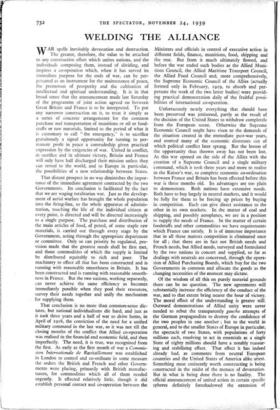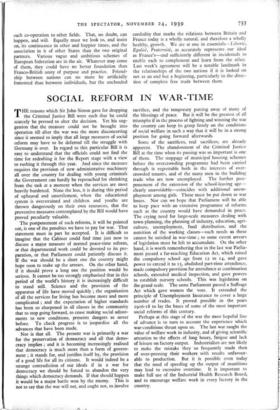WELDING THE ALLIANCE
WAR spells inevitably devastation and destruction. The greater, therefore, the value to be attached to any constructive effort which unites nations, and the individuals composing them, instead of dividing, and inspires a co-operation which, when it has served its immediate purpose for the ends of war, can be per- petuated as an instrument for the maintenance of peace, the promotion of prosperity and the cultivation of intellectual and spiritual understanding. It is in that broad sense that the announcement made last Saturday of the programme of joint action agreed on between Great Britain and France is to be interpreted. To put any narrower construction on it, to treat it simply as a series of concrete arrangements for the common purchase and transportation of munitions or oil or food- stuffs or raw materials, limited to the period of what it is customary to call " the emergency," is to sacrifice gratuitously a signal opportunity for turning to per- manent profit in peace a comradeship given practical expression by the exigencies of war. United in conflict, in sacrifice and in ultimate victory, Britain and France will only have half discharged their mission unless they can reveal to the world, and to Europe in particular, the possibilities of a new relationship between States.
That distant prospect in no way diminishes the impor- tance of the immediate agreement contracted by the two Governments. Its conclusion is facilitated by the fact that we are waging totalitarian war. Just as the develop- ment of aerial warfare has brought the whole population into the firing-line, so the whole apparatus of adminis- tration, touching the life of the individual citizen at every point, is directed and will be directed increasingly to a single purpose. The purchase and distribution of the main articles of food, of petrol, of some staple raw materials, is carried out through every stage by the Government, acting through the appropriate department or committee. Only so can priority be regulated, pro- vision made that the greatest needs shall be first met, and those commodities of which the supply is limited be distributed equitably to rich and poor. The machinery to effect all that has been constructed and is running with reasonable smoothness in Britain. It has been constructed and is running with reasonable smooth- ness in France. But the two nations, working separately, can never achieve the same efficiency as becomes immediately possible when they pool their resources, survey their needs together and unify the mechanism for supplying them.
That conclusion is no more than common-sense dic- tates, but national individualisms die hard, and just as it took three years and a half of war to drive home, in April of 1918, the conviction of the need for a unified military command in the last war, so it was not till the closing months of the conflict that Allied co-operation was realised in the financial and economic field, and then imperfectly. The need, it is true, was recognised from the first. As early as the first month of war a Commis- sion Internationale de Ravitaillement was established in London to control and co-ordinate in some measure the orders the British and French and other Govern- ments were placing, primarily with British manufac- turers, for commodities which all of them needed urgently. It effected relatively little, though it did establish personal contact and co-operation between the Ministers and officials in control of executive action in different fields, finance, munitions, food, shipping and the rest. But from it much ultimately flowed, and before the war ended such bodies as the Allied Muni- tions Council, the Allied Maritime Transport Council, the Allied Food Council and, more comprehensively, the Supreme Economic Council of the Allies (actually formed only in February, 1919, to absorb and per- petuate the work of the two latter bodies) were provid- ing practical demonstration daily of the fruitful possi- bilities of international co-operation.
Unfortunately nearly everything that should have been preserved was jettisoned, partly as the result of the decision of the United States to withdraw completely from the European scene. Otherwise the Supreme Economic Council might have risen to the demands of the situation created in the immediate post-war years, and averted many of the economic distresses out of which political conflict later sprang. But the lesson of the opportunity thus thrown away has not been lost. As this war opened on the side of the Allies with the creation of a Supreme Council and a single military command, which it took three years and more to realise in the Kaiser's war, so complete economic co-ordination between France and Britain has been effected before this war is three months old. Its advantages are too plain to demonstrate. Both nations have extensive needs. Both have to buy largely in neutral markets, and it would be folly for them to be forcing up prices by buying in competition. Each can give direct assistance to the other in its own markets. In the matter of coal and shipping, and possibly aeroplanes, we are in a position to supply the needs of France. In the matter of certain foodstuffs and other commodities we have requirements which France can satisfy. It is of immense importance that in all these matters competition is eliminated once for all ; that there are in fact not British needs and French needs, but Allied needs, surveyed and formulated by the two nations in concert and supplied, so far as dealings with neutrals are concerned, through the opera- tion of Allied Purchasing Boards, which buy for the two Governments in common and allocate the goods as the changing necessities of the moment may dictate.
Of the wisdom of all this on purely material grounds there can be no question. The new agreements will substantially increase the efficiency of the conduct of the war, and to that extent bring nearer the hour of victory. The moral effect of the understanding is greater still. Outward demonstrations of Allied unity were never needed to rebut the transparently gauche attempts of the German propagandists to destroy the confidence of the two peoples in one another ; but to the world in general, and to the smaller States of Europe in particular, the spectacle of two States, with populations of forty millions each, resolving to act in essentials as a single State of eighty millions should have a notably reassur- ing and stabilising effect. That effect it has indeed already had, as comments from neutral European countries and the United States of America alike attest. Something most eminently worth constructing is being constructed in the midst of the menace of devastation. But in what is being done there is no finality. The official announcement of united action in certain specific spheres definitely foreshadowed the extension of such co-operation to other fields. That, no doubt, can happen, and will. Equally must we look to, and insist on, its continuance in other and happier times, and the association in it of other States than the two original partners. Various vague and ambitious schemes of European federation are in the air. Whatever may come of them, they could have no better foundation than Franco-British unity of purpose and practice. Friend- ship between nations can no more be artificially fomented than between individuals, but the unclouded cordiality that marks the relations between Britain and France today is a wholly natural, and therefore a wholly healthy, growth. We are at one in essentials--Iiberte, Egalite, Fraternite, as accurately represents our ideal as France's—and sufficiently different in incidentals to enable each to complement and learn from the other. Last week's agreement will be a notable landmark in the relationships of the two nations if it is looked on not as an end but a beginning, particularly in the direc- tion of complete free trade between them.





































 Previous page
Previous page